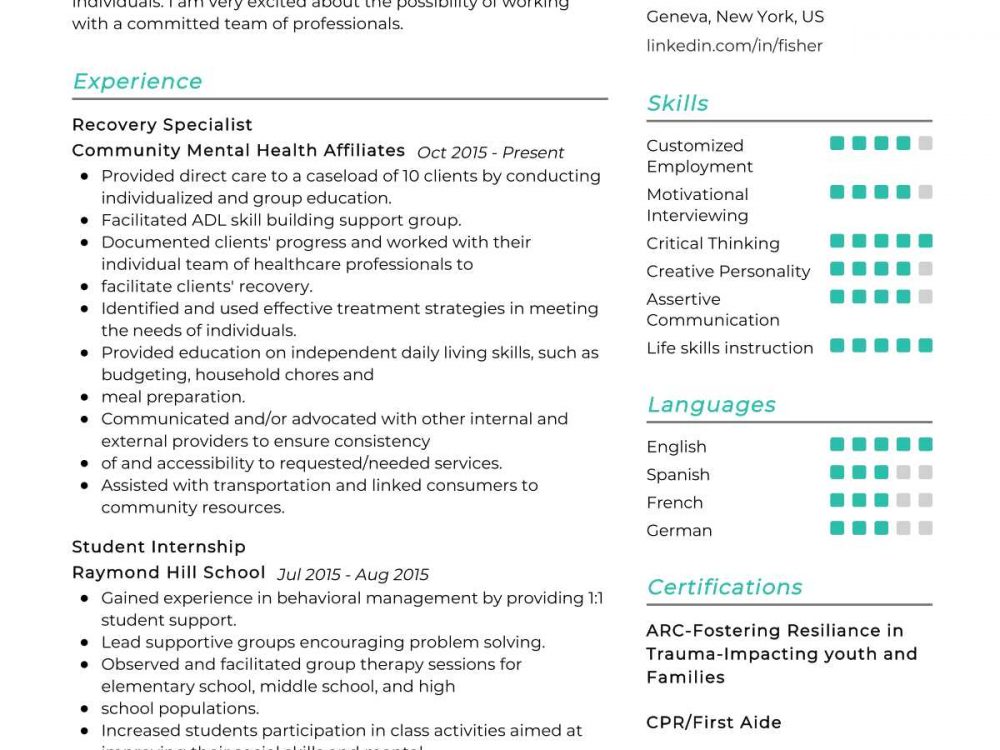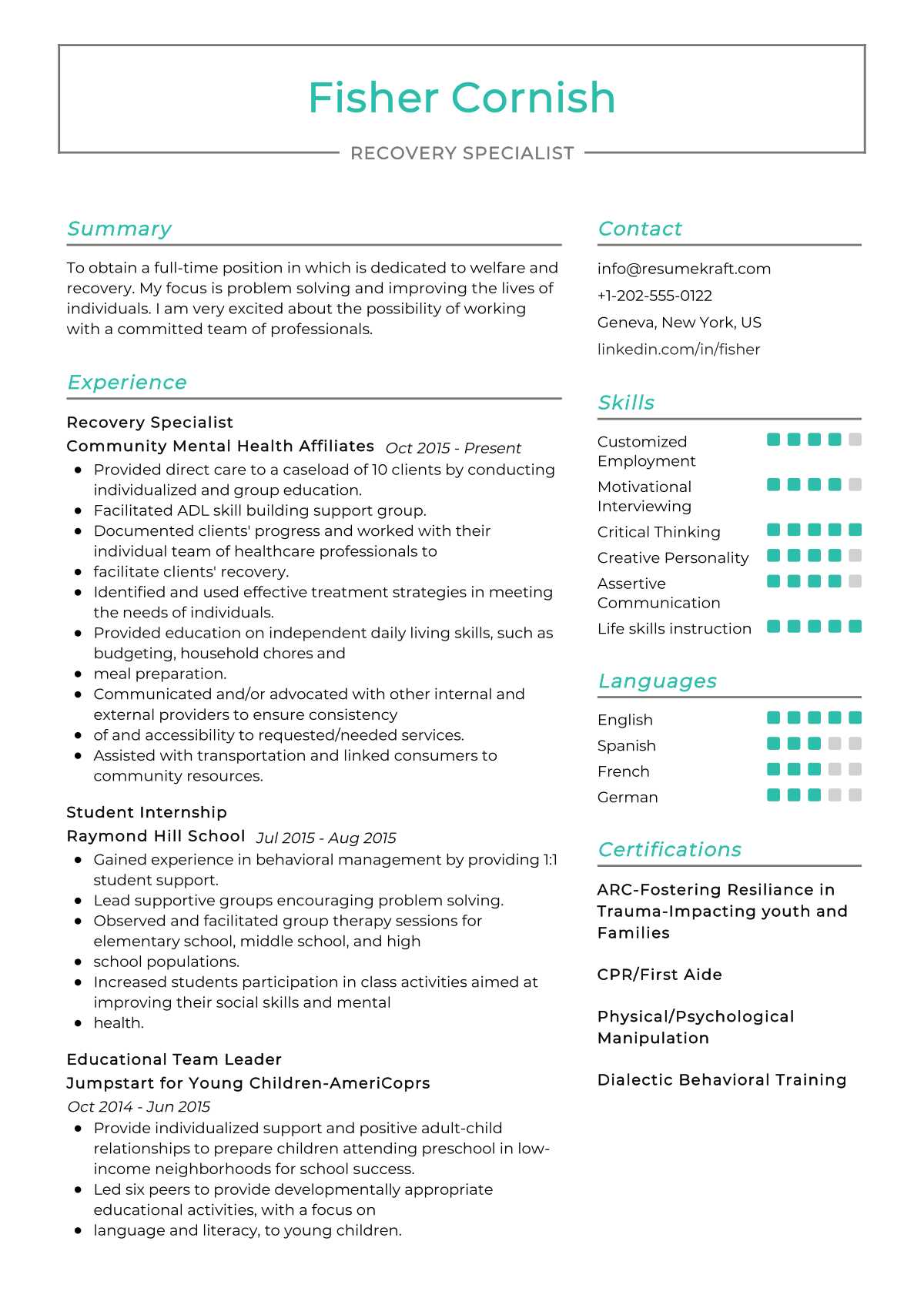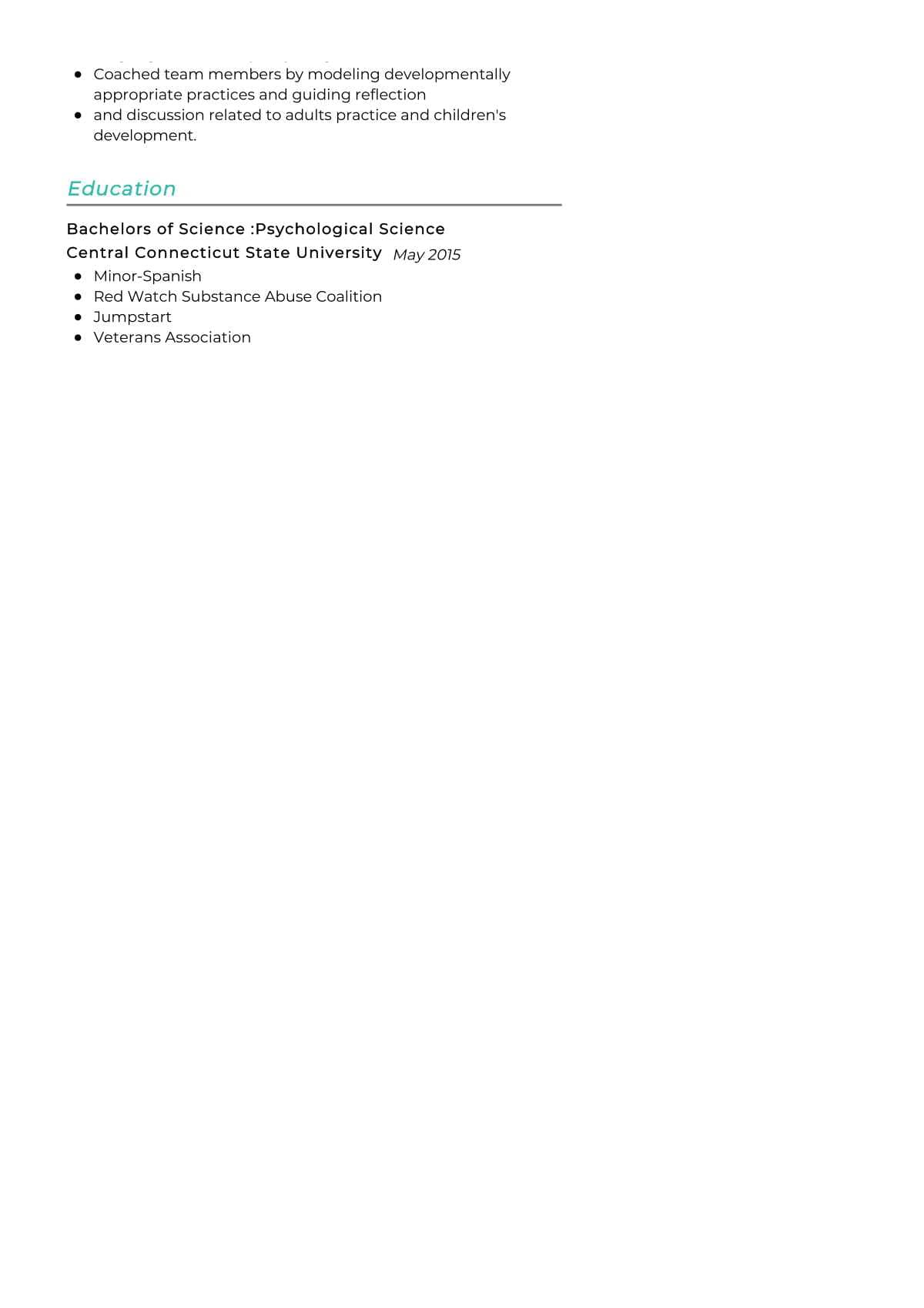Recovery Specialist Resume Sample
Fisher Cornish
Recovery Specialist
Summary
To obtain a full-time position in which is dedicated to welfare and recovery. My focus is problem solving and improving the lives of individuals. I am very excited about the possibility of working with a committed team of professionals.
Skills
Work Experience
Recovery Specialist
Community Mental Health Affiliates
- Provided direct care to a caseload of 10 clients by conducting individualized and group education.
- Facilitated ADL skill building support group.
- Documented clients’ progress and worked with their individual team of healthcare professionals to
- facilitate clients’ recovery.
- Identified and used effective treatment strategies in meeting the needs of individuals.
- Provided education on independent daily living skills, such as budgeting, household chores and
- meal preparation.
- Communicated and/or advocated with other internal and external providers to ensure consistency
- of and accessibility to requested/needed services.
- Assisted with transportation and linked consumers to community resources.
Student Internship
Raymond Hill School
- Gained experience in behavioral management by providing 1:1 student support.
- Lead supportive groups encouraging problem solving.
- Observed and facilitated group therapy sessions for elementary school, middle school, and high school populations.
- Increased students participation in class activities aimed at improving their social skills and mental health.
Educational Team Leader
Jumpstart for Young Children-AmeriCoprs
- Provide individualized support and positive adult-child relationships to prepare children attending preschool in low-income neighborhoods for school success.
- Led six peers to provide developmentally appropriate educational activities, with a focus on language and literacy, to young children.
- Coached team members by modeling developmentally appropriate practices and guiding reflection and discussion related to adult practice and children’s development.
Education
Bachelors of Science: Psychological Science
Central Connecticut State University
Languages
- French
- English
- German
- Chines
Recovery Specialist Resume Writing Guide & Tips
The article will cover what is a recovery specialist and what is their role in the process. It’ll also address what employers are looking for when they read these resumes and provide examples of what to include on your resume as well as tips from professionals in the field. It’ll also discuss how to customize it to you as well as how long should a resume be.
A career in healthcare would be an excellent choice for anyone who has a naturally nurturing personality, thrives on helping people, and enjoys working with data. What is a recovery specialist? The following is some basic information about this healthcare career:
How to write a Recovery Specialist Resume:
A good recovery specialist resume not only highlights your experience but shows what value you can bring to the company. Remember: you are your own advocate, and by putting your best foot forward, you will help ensure that the employer will review your qualifications and experience with interest.
Contact Information for Recovery Specialist Resume: If you do not have current contact information on your resume, simply enter the email address you are using to receive your Resume Ready message at the time of submission.
If you already have a valid email address on your resume, just include the email address in the “Email Address” section of your resume. To help ensure that no one else has submitted this same email address, we will verify it and ask you to submit a new identifier for us to process.
Summary for Recovery Specialist Resume:
Your Resume Summary is the first impression you make on the employer. This section of your resume will be read first, and maybe one of the most important factors in whether or not an employer will look more deeply at your qualifications. Use this space to highlight your professional experience, education and training, and skills that relate to specific jobs that interest you.
Work Experience in Your Recovery Specialist Resume:
Work experience includes any full-time and/or part-time jobs you have held, excluding internships or temporary positions.
For each job you must include: Job title, Company Name, Location, Starting date, Duration of Employment (if less than a year), Brief description of your role on the job.
Education in Your Recovery Specialist Resume: You can include any education or degrees that are relevant to the type of job you’re seeking.
Education on a Recovery Specialist Resume: For each education you should include: Name of School, Year Graduated, Degree or Certificates Received and Major or Specialization, and your specialization.
For example:
“Bachelor of Arts in Criminal Justice from G. W. University”
Professional Skills in Recovery Specialist Resume: For each skill, you should include: the name of the skill, a brief description of what you can do with that skill, and the program or tool you used to acquire it.
List of Typical Responsibilities For a Recovery Specialist Resume:
- Researched and wrote case studies relating to the company’s services for use in promotional and advertising materials.
- Provided support to marketing department by researching, writing and editing marketing copy for brochures, web site and other promotional materials.
- Researched a variety of writing styles, including journalistic, trade journal, feature article and scientific journal style in order to develop appropriate writing style guides for all internal communication channels.
- Developed writing guidelines for training and support materials.
- Conducted market research and survey to gather information about potential new clients, competitors and competitor products/services.
- Researched industry “best practices” and researched best practices in recovered property management in order to determine best practices via surveys/ interviews with recovered property managers in the industry.
- Created business meeting agendas, meeting minutes and other supporting documentation for business meetings as necessary, e.g., training meetings with agency representatives, internal reviews of marketing materials, etc..
- Developed and revised company training materials, including policy and procedure manuals, sales training manuals, online learning curriculum and other materials as necessary to meet changing industry needs.
- Developed a wide variety of marketing and selling tools that are still used in the agency today, including brochures, case studies, PowerPoint presentations and e-mail marketing campaign templates.
- Contributed to special projects, including the company’s annual report [or similar].
Top 10 Must-have Recovery Specialist Skills:
- Strong Communication Skills: This is the most important skill for any hiring manager. Home care and wound care professionals need to be able to communicate effectively not only with your patients but also with their families.
- Good Oral Communication Skills: You must be able to speak clearly and concisely about what you have done for your patients in the past and what skills you have that will help them in the future.
- Detail-oriented: You need to know everything about your patient so that when they call you for their annual appointment, they feel comfortable being open and honest with you.
- Flexible: You need to be able to adapt to the needs of your patients as their health conditions change over time.
- Organized: Your files and records must be up-to-date and in order at all times and take into consideration all your patients’ needs at every appointment.
- Patient and Kind: As wound care and home health professional, you must be able to relate to all types of people and personalities.
- Ability to manage time well: You need to know how to prioritize your work so that you can meet the needs of your patients in a timely manner, while still keeping up with the rest of your responsibilities.
- Effective Teamwork Skills: You need to be able to deal with situations that may require teamwork, and you will find that this is a requirement for many of your jobs.
- Emotional Intelligence: You need to understand how to deal with people in general, and individuals who may not have the best of health or emotional situations, because you could be their primary caregiver at one time or another.
- Learn New Technologies: In today’s workforce, it seems like all new computer skills are required for just about everything.
How to write a Recovery Specialist Cover Letter:
- Customize your cover letter to the job opening. Make sure you mention the keywords that match the job description in your resume
- Make sure that you customize the cover letter to each job posting, it is common for someone to put up multiple vacancies
- Explain why you would make a good fit for the position and why you are interested in working for their company
- Mention your key skills and experience applicable to the position you are applying for
- Mention the location or locations where you would be willing to work
- Mention the job title you are applying for. This will ensure that your cover letter is sent to the correct person for consideration
Key Takeaways:
- Use your resume to demonstrate your skills, experiences, and expertise.
- Customize your resume for each individual job or even each company.
- Tailor your resume specifically to the requirements of the job descriptions.
- Do not use a generic template for every single job application. Tailor it specifically to the requirements of the job description.
- Make sure you use tables and lists in your resume. That way you can highlight important skills, experiences or other information that can help get you hired more quickly.



